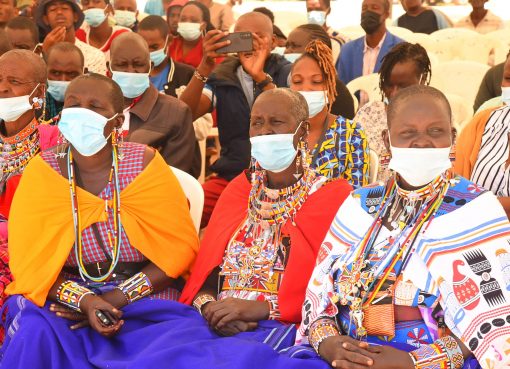Kwale-based Australian mining firm Base Titanium is reclaiming and rehabilitating degraded mined sites using indigenous tree species.
The mining firm located in Msambweni sub-county of Kwale, simply known as Base, produces ilmenite, rutile, and zircon, which are all considered critical minerals.
The Kwale Mine is accredited as a Kenya Vision 2030 flagship mining project and represents a significant impact on the local and national economies.

Base Titanium’s Environment and Mining teams have been spearheading rehabilitation efforts to return mined-out land at the Kwale operations to its former state or even better.
Being close to the Coastal Forests of Eastern Africa biodiversity hotspot, Base has been able to nurture a biodiversity corridor to link the remnant patches of indigenous forest occurring in the mining lease to the existing Gogoni Forest Reserve.
Base Titanium General Manager (GM), External Affairs Simon Wall says restoration of mine-degraded landscapes provides an opportunity to reinstate ecological integrity and develop as a self-sustaining ecosystem.
He says that as the largest mine in Kenya, Base Titanium has been and continues to be a huge success, contributing about 65 per cent of Kenya’s mineral output value.
Speaking when he hosted Kwale County Commissioner (CC) Meru Mwangi, Wall said rehabilitation and ecological restoration of areas disturbed by mining activities seek to mitigate climate change and re-establish flora and fauna.
Mr. Wall says sustainable conservation, rehabilitation, and ecological restoration programmes are now focused on the mined-out areas of the South and Central Dunes.
He stated that agricultural tests with locally available crops have been conducted to demonstrate that the rehabilitated land can support the desired post-mining land use.
The top mining official said Base’s research and trials on the viability of agriculture on mined-out land in collaboration with Kilifi-based Pwani University are still ongoing.

He said the agricultural activities seek to generate jobs and revenue for the government and provide training opportunities for local farmers.
The External Affairs GM said so far, the mining company has been able to rehabilitate more than 200 hectares of mined land by filling the mine pits and covering the land with native grass and tree species.
As part of its conservation and restoration programme, Base has established an indigenous tree nursery to propagate and replant endangered plant species in Kwale.
Base’s indigenous tree nursery is considered one of the largest in East Africa, with a total of 274 different species and 14,062 trees of conservation significance.
Wall says Base Titanium currently has over 37,000 indigenous trees in stock at the Kwale Operations indigenous tree nursery, ready for land rehabilitation and reforestation.
“We have sound environmental management practises in place and are reclaiming degraded mined sites using native tree species,” he said.
He says rehabilitation and restoration are two key processes necessary to minimise and mitigate the impacts of mining operations.
Rehabilitation of mined-out areas begins by shaping the area into dunes similar to those that existed before mining to ensure natural drainage areas are followed.
After that, shaping and topsoil spreading, manuring, and mulching are done to enhance soil organic matter and prepare for vegetation.
Mulching protects the sown seeds from birds and wind and insulates the soil from excessive heat and rain.
Wall said Base Titanium will not abandon its operations site without it being adequately decommissioned and reclaimed, saying it’s a key plank in its mine closure plan.
He says Base’s indigenous tree nursery plays a pivotal role in the rehabilitation of mined-out areas, adding that since the rehabilitation programme started, a variety of pioneer plant species, including grass and shrubs, have been planted on more than 600 acres of land.
The ecological rehabilitation programme has seen the restoration of forest patches along the Mukurumudzi River shoreline and also restored wetlands around the mining areas.
CC Mwangi hailed Base Titanium for its efforts in the ecological restoration of mined areas.
Mr. Mwangi, who was accompanied by County Police Commandant Stephen Ngetich, was on a familiarisation tour of the Kwale Mineral Sands Operations.
The administrator says the visit was to discuss ways of exploring and deepening existing collaboration initiatives in conservation and rehabilitation.
Mr. Mwangi says Base Titanium’s efforts to plant trees in an effort to rehabilitate mined out areas fit well into the national government’s agenda to plant five billion trees between now and 2027.
The CC and his team also had the opportunity to plant trees in already mined-out areas as part of rehabilitation efforts by Base.
He said the economic impact of forest degradation is alarming and called for immediate action from all and sundry in a bid to protect the country from the ravages of climate change.
Mwangi said the greening initiative would be meaningless unless stakeholders made it a part of their culture to care for trees all year.
Base Titanium operates a large indigenous tree nursery and arboretum to conserve and propagate trees of conservation importance.
In collaboration with various specialists, Base Titanium also regularly undertakes habitat surveys to improve knowledge of the region’s rich biodiversity.
By Hussein Abdullahi



